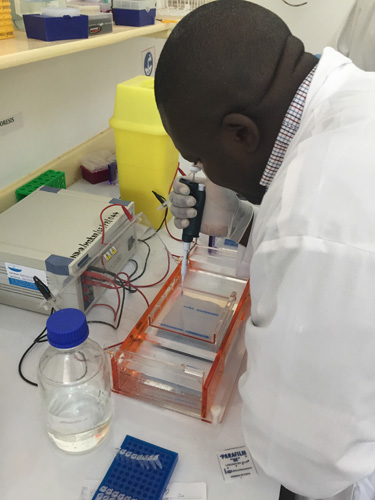 The Democratic Republic of the Congo
The Democratic Republic of the Congo
Malaria remains a serious public health problem in the Democratic Republic of the Congo (DRC) despite sustained malaria control strategies. Given that nearly all of the DRC population lives in high transmission zones, it has been estimated that the DRC accounts for 12% of all cases of malaria in sub-Saharan Africa (WHO, 2021).
Due to a lack of data on insecticide susceptibility and vector bionomics in the country, PMI expanded its entomological support in 2014/15 under AIRS from four sentinel sites to seven sites. Insecticide susceptibility testing was extended further to 11 sites in 11 provinces in 2016/17 and under VectorLink in year one (2018) the scope of testing was expanded to include pyrethroid resistance intensity assays. In year two (2019), Institut National de Recherche Bio-médicale (INRB) conducted insecticide resistance monitoring activities in 10 sites (two sites in each of five provinces), while in year three susceptibility monitoring was conducted in 13 sites (one site per province) and 12 sites in year four. Sites were chosen strategically to ensure data was collected to inform ITN procurement for upcoming mass distribution campaigns.
Monthly vector bionomics monitoring was conducted in Lodja (Sankuru Province) for 3 years from 2015-2017 and in Kapolowe (Haut Katanga Province) from 2016-2017. In 2018 and 2019 monthly vector bionomics monitoring was conducted through VectorLink in Kabondo (Tshopo Province) and Kalemie (Tanganyika Province), with Lodja reinstated in 2019. Monthly vector bionomics monitoring continued in 2020 and 2021 in Lodja along with two new sites, namely Inongo (Mai-Ndombe) and Kimpese (Kongo Central).
In addition to PMI support, the DRC NMCP received Global Fund financial support in 2019 to conduct additional entomological monitoring in nine sites (Boende (Tshuapa), Lisala (Mongala), Mweka (Kasaï), Nyankunde (Ituri), Bolenge (Equateur), Vanga (Kwilu), Kalima (Kasai), Kasai Oriental (Dibindi) and Lomami (Mweneditu), in partnership with the University of Kinshasa.
In year five (October 2021 – September 2022), the PMI VectorLink DRC project worked with the NMCP, INRB, the Kinshasa School of Public Health (PHSK), University of Kinshasa and other local stakeholders to conduct entomological monitoring. Key objectives listed below.
Insectary and Laboratory Activities
- Supported the INRB and PHSK to manage the insectary to include maintenance of the susceptible reference colony of coluzzii Ngousso, ensuring that all activities in the insectary follow standard protocols.
- Conducted laboratory analyses of a sub-sample of malaria vectors from all sites where insecticide resistance and vector bionomics monitoring is conducted. Tests included mosquito species identification, detection of sporozoites, and presence of molecular markers of insecticide resistance.
Field Activities
- Determined insecticide susceptibility status of gambiae s.l., and An. funestus s.l. where collected in sufficient numbers, in 14 sites across 14 provinces. Synergist assays with piperonyl butoxide (PBO) and pyrethroid resistance intensity assays were also conducted. The following insecticides were tested, in order of priority: deltamethrin, permethrin, alpha-cypermethrin, deltamethrin + piperonyl butoxide (PBO), permethrin + PBO, alpha-cypermethrin + PBO and chlorfenapyr, deltamethrin intensity, permethrin intensity, alpha-cypermethrin intensity.
- Conducted monthly vector bionomics monitoring in Kenge, Karawa, and Lodja. Vector species composition, spatial and temporal distribution, biting and resting densities, behavior, and Plasmodium sporozoite infection rates were determined. In addition, human behavior was monitored when human landing catches (HLCs) were being done to determine the relative biting risk indoors and outdoors.
- Conducted 14- and 27-month entomological and ITN bio-efficacy monitoring of PBO ITNs in Sud Ubangi Province (June 2022 and September 2022, respectively).
- Conducted 12-month durability monitoring of ITNs distributed in Tanganyika Province (December 2021).
- Conducted pre-distribution testing of ITNs distributed in Nord Ubangi Province.
- Conducted bi-annual monitoring (dry and rainy season) of reported and observed household net use in Tanganyika Province in November 2021 and February 2022.
- Piloted water hygiene and sanitation supervisors-based entomological monitoring in the provinces of Ituri, Kasai and Nord Kivu.
National-Level Support
- Facilitated bi-annual national vector control technical working group (TWG) meetings to report and discuss entomology data for use in NMCP decision-making. Participating organizations included the NMCP, Tenke-Fungurume Mining company (TFM), University of Kinshasa, INRB, PMI VectorLink, and Centre de Recherche en Sciences Naturelles.
- Organized two entomology dissemination meetings with the NMCP to share quarterly activities’ tracker, report and discuss entomology data for use in NMCP decision-making. Participating organizations included NMCP, University of Kinshasa, INRB and PMI VectorLink.
- Trained and supported three NMCP technicians located in the new sites of Kamina and Kenge, in entomological techniques for monitoring malaria vectors and provide refresher training during INRB visits to other sites on data management, running the insectary, and entomological monitoring at the sentinel sites through on-job-training and coaching.

